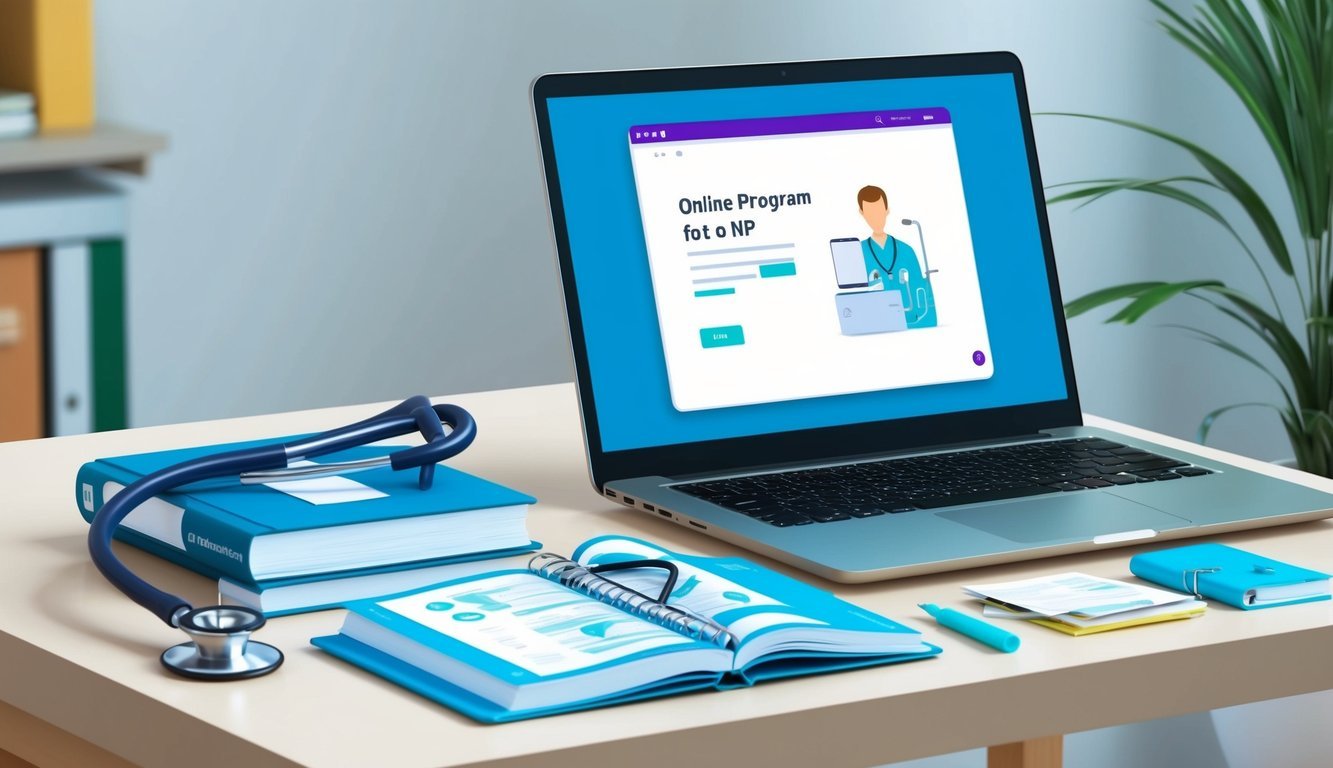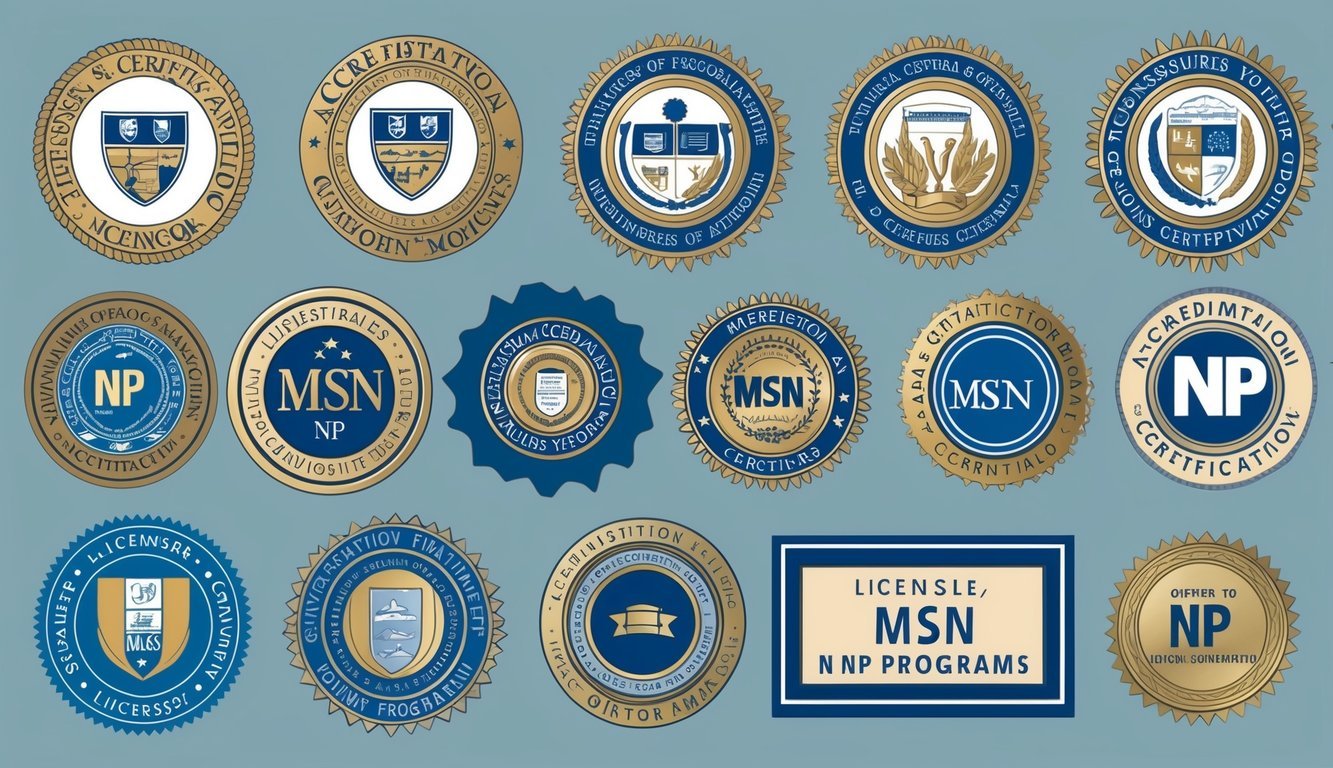If you are a registered nurse looking to advance your career, exploring MSN to NP programs can be a pivotal step.
These programs allow you to transition from a Master of Science in Nursing (MSN) to becoming a Nurse Practitioner (NP), enabling you to provide high-quality care and take on leadership roles in healthcare settings. Completing an MSN to NP program typically takes about two years.
It equips you with the skills to diagnose and treat patients across various specialties.
As the healthcare landscape evolves, the demand for nurse practitioners continues to rise.
A key advantage of pursuing an MSN to NP program is the opportunity to specialize in areas such as family care, pediatric care, or adult gerontology.
By obtaining this advanced degree, you not only enhance your career prospects but also expand your ability to make a significant impact on patient outcomes.
The transition to becoming a nurse practitioner offers numerous benefits, including higher earning potential and increased job autonomy.
With a variety of programs available, you can find one that fits your schedule and career goals.
Whether you’re looking for online options or traditional classroom experiences, there are resources to help guide you in making this important career decision.
For more detailed comparisons and options, explore this list of top MSN to NP programs.
Understanding MSN to FNP Programs
Transitioning from a Master of Science in Nursing (MSN) to becoming a Family Nurse Practitioner (FNP) involves extensive education and training.
This pathway equips you with the necessary skills to provide comprehensive healthcare to diverse populations.
Here’s a closer look at what this entails.
Defining MSN and FNP
A Master of Science in Nursing (MSN) is an advanced nursing degree that prepares you for various roles within the healthcare system.
It focuses on enhancing your clinical skills, leadership abilities, and knowledge in nursing theory.
The Family Nurse Practitioner (FNP) role is a specialization within the nursing field, allowing you to deliver primary care across various settings.
FNPs are equipped to diagnose and treat illnesses, prescribe medications, and manage patient care for all age groups.
Many MSN programs that offer FNP specializations require a minimum of 500 clinical hours, emphasizing hands-on experience in diverse healthcare environments.
The courses typically cover topics such as pharmacology, advanced assessment, and family-centered care.
The Role of Family Nurse Practitioners
As an FNP, you assume a critical role in health promotion, disease prevention, and management of chronic conditions.
Your training enables you to work autonomously or as part of a healthcare team.
FNPs provide care in various settings, including hospitals, outpatient clinics, and community health centers.
Key responsibilities include:
- Conducting patient assessments
- Developing treatment plans
- Monitoring patient progress
In today’s healthcare environment, FNPs play an essential role in team-based care models.
They increasingly assist in managing patient populations needing preventive and primary care, making them integral to improving health outcomes.
For more insights into MSN to FNP programs, you might find this guide helpful.
Admission and Program Structure

You will find that understanding the admission requirements and the structure of MSN to NP programs is essential in your journey.
The programs typically offer a combination of core clinical courses and options for specialization, with formats accommodating both online and traditional classroom settings.
Admission Requirements
To gain entry into an MSN to NP program, you generally need a few key qualifications.
Most programs require applicants to hold a baccalaureate degree in nursing (BSN) and possess an active RN license.
Some programs may accept candidates with an ADN, providing a bridge option.
Common application materials include:
- Transcripts from your previous educational institutions
- A current resume outlining your nursing experience
- Letters of recommendation
- A personal statement detailing your career aspirations
Ensure that the program is accredited by a recognized body, such as the Commission on Collegiate Nursing Education (CCNE) or the Accreditation Commission for Education in Nursing (ACEN), to ensure quality education.
Overview of Curriculum and Specializations
The curriculum for MSN to NP programs includes a diverse range of courses designed to equip you with advanced nursing knowledge and skills.
Core subjects often cover areas such as:
- Pathophysiology
- Pharmacology
- Advanced health assessment
You will also have the opportunity to specialize in various areas, such as:
- Family Nurse Practitioner (FNP)
- Pediatric Nurse Practitioner (PNP)
- Adult Gerontology Nurse Practitioner (AGNP)
Clinical placement is vital, providing hands-on experience that aligns with your specialization.
Some programs allow you to customize your electives to tailor the education to your career goals.
Online vs. Traditional Classroom Structures
When considering MSN to NP programs, you will notice options for both online and traditional classroom formats.
Online programs typically provide flexibility, allowing you to balance your studies with work or personal commitments.
They often include asynchronous learning, meaning you can access course materials at your convenience.
Traditional classroom settings offer direct interaction with instructors and peers.
This format can enhance learning through hands-on experiences and immediate feedback.
Some programs blend both approaches, giving you the best of each world.
Clinical Practice and Learning Outcomes
In MSN to NP programs, practical experience is crucial for developing essential clinical skills.
Focusing on clinical hours, training, and interprofessional collaboration ensures that you gain a thorough understanding of patient care in various settings.
Clinical Hours and Training
Clinical hours are fundamental in MSN to NP programs.
You typically need to complete a specified number of clinical hours during your practicum experience, which includes direct patient care.
These hours provide realistic exposure to patient interactions and health assessments.
The Division of Nursing often outlines these requirements clearly.
You can expect to engage in various scenarios, enhancing both your assessment skills and clinical competencies.
| Program Component | Typical Hours Required |
|---|---|
| Practicum Experience | 600-1000 hours |
| Supervised Patient Care | Varies by specialization |
Your clinical training will involve hands-on experiences under the guidance of experienced preceptors and instructors.
This mentorship is invaluable as you refine your ability to perform advanced health assessments effectively.
Achieving Advanced Clinical Skills
As you progress through your MSN to NP program, you will focus on achieving advanced clinical skills crucial for your future practice.
This includes proficiency in health assessments, diagnostic reasoning, and patient-centered care.
Practicum courses emphasize not only technical skills but also the development of critical thinking.
You will apply theoretical knowledge to practical situations, which enhances your decision-making abilities in real-time healthcare scenarios.
Furthermore, you will learn to implement evidence-based practices during your clinical rotations.
This approach ensures you stay current with advancements in healthcare, ultimately benefiting your patients.
Interprofessional Collaboration and Field Experience
Interprofessional collaboration is a key element of MSN to NP programs.
Your field experience will involve working alongside various healthcare professionals.
This collaboration helps you understand different roles within the healthcare system and fosters a team-based approach to patient care.
Through interactions with nurses, physicians, and allied health professionals, you develop comprehensive communication skills.
These skills are essential for advocating effectively for your patients and leading interdisciplinary teams.
During your practicum, you will often participate in case discussions and collaborative planning sessions, which enhance your learning and broaden your perspective on patient care.
This experience prepares you to work in diverse environments and adapt to the needs of the healthcare system.
Licensure, Accreditation, and Certification

Understanding the requirements for licensure, accreditation, and certification is crucial as you transition from an MSN program to becoming a Nurse Practitioner (NP).
These elements ensure that you meet professional standards and can practice safely and effectively.
Preparing for National Certification Exam
Before you can practice as an NP, you must pass a national certification exam.
This exam assesses your knowledge and competencies specific to your specialty area, whether it’s Family, Adult-Gerontology, or another focus.
To prepare, you can utilize resources such as review courses, practice tests, and study guides.
The American Nurses Credentialing Center (ANCC) offers certification options in various specialties that align with your education level.
Familiarize yourself with the content outline of the exam and schedule ample study time.
Ensure you meet eligibility requirements, which often include completing an accredited MSN program.
State Licensure and Professional Standards
Each state has specific licensing requirements for NPs, governed by the state’s Board of Nursing.
You must apply for state licensure after passing your national certification exam to legally practice as an NP.
Key factors include submitting proof of your education, certification, and passing a criminal background check.
It’s essential to stay informed about your state’s regulations since they can vary significantly.
Ensure compliance with continuing education requirements as well to maintain your licensure.
Regularly check your state’s Board of Nursing website for updates on regulations and licensing requirements.
Accreditation Bodies and Educational Quality
Accreditation is a crucial part of ensuring educational quality for your nursing program.
It typically involves evaluations by recognized bodies like the Commission on Collegiate Nursing Education (CCNE) or the Accreditation Commission for Education in Nursing (ACEN).
These organizations assess programs based on their curriculum, faculty qualifications, and student outcomes.
Graduating from an accredited program is often a prerequisite for certification and licensure.
Always verify that your MSN program holds accreditations from these bodies to enhance your professional credibility and employability.
Use CCNE’s official website for more information on accredited programs.
Career Outlook and Advancement

The career outlook for professionals pursuing MSN to NP programs is strong, with numerous opportunities for advancement and job security.
As healthcare needs evolve, advanced practice registered nurses (APRNs) are increasingly positioned to meet these demands, signaling a vibrant future in the nursing field.
Job Market and Security
The job market for nurse practitioners (NPs) continues to grow rapidly.
The U.S. Bureau of Labor Statistics projects a 38% employment increase for NPs from 2022 to 2032.
This growth is due to an aging population, greater access to healthcare, and a shift toward preventive care.
Job security remains robust as healthcare settings require more NPs to manage patient care.
In many states, NPs can operate independently, increasing their employability.
The average salary for registered nurses is $86,070, while nurse practitioners can expect to earn around $126,260 annually, reflecting the value of advanced training.
Advancing from RN to Advanced Practice
Transitioning from a registered nurse (RN) to an advanced practice role can significantly enhance your career trajectory.
Becoming an NP involves obtaining a Master of Science in Nursing (MSN) degree, which equips you with advanced clinical skills and knowledge.
Many programs offer pathways for RNs with a BSN or those holding an RN to BSN degree.
Completing an MSN prepares you for various specialties, such as family practice or acute care, ultimately leading to higher pay and responsibilities.
Certification as an NP enhances your qualifications and opens doors to leadership roles in healthcare settings.
The Path to Doctor of Nursing Practice (DNP)
For those aiming higher, the Doctor of Nursing Practice (DNP) offers an advanced route for career progression.
This terminal degree emphasizes clinical practice and leadership development.
The DNP program builds on the skills acquired in MSN programs.
It focuses on evidence-based practice, quality improvement, and healthcare policy.
Pursuing a DNP can position you for leadership roles, such as director of nursing or clinical educator.
These roles provide opportunities for influence and innovation in healthcare.
The elevated credential also prepares you for research roles, allowing you to impact nursing practice effectively.
By exploring these paths, you can strategically navigate your nursing career and maximize your professional potential.

